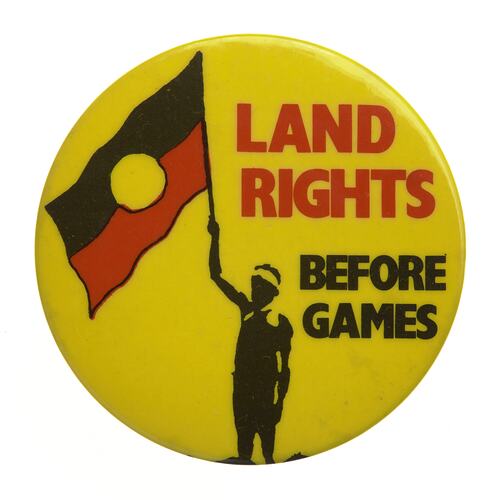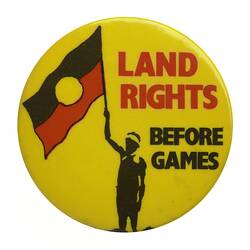Indigenous Australians were determined to use the 1982 Commonwealth Games held in Brisbane as a 'forum for justice': to highlight the injustices and discrimination suffered by Queensland Aborigines and raise the issue of land rights on both a national and international platform. As early as January 1982 it was clear that indigenous Australians were planning action at the Games. One of the central aims of the campaign was to gain freehold title to indigenous lands in Queensland and control over mining on those lands. Another aim was to transfer control of Aboriginal affairs from State to Federal government under powers granted by the referendum in 1967. The Commonwealth had thus far been unwilling to do so.
As the Games drew near there were calls by many Queensland Aborigines for people to come out and support the demonstrations to highlight the discrimination they suffered in the state. However, indigenous leaders were split in their views as to how such protests could best be achieved. Budger Davidson, the Black Protest Committee organiser, and his committee members believed that the best way to convince the nation and the world that indigenous Australians were 'long overdue for self-management' was by staging a number of peaceful rallies and cultural festivities. However, with a growing threat of indigenous activity during the Games, the then Queensland Premier Joh Bjelke-Peterson declared a State of Emergency and proclaimed street marches illegal; Queensland police approved just two marches. All other protests were deemed illegal; marchers were to be arrested and charged under the newly installed Games legislation. Some Aboriginal leaders were unhappy with the Black Protest Committee's program believing that a 'pleasant scene of didgeridoo concerts would make little impact' in the struggle for land rights.
Around 2,000 people marched for land rights in Brisbane on 26 September 1982. In what was named Queensland's biggest Aboriginal march, protesters carrying placards and banners walked peacefully from the city to a park across the Brisbane River. On 29 September 1,000 people marched peacefully through central Brisbane in support of land rights. Protesters held banners and wore badges and stickers that read 'Stop playing games: land rights now'. Despite the Premier's ban on street marches, further protests were staged in Brisbane during the Games. Thirty-nine protesters were arrested at a demonstration during the opening ceremony on 30 September. As the police moved in to arrest demonstrators they chanted 'the whole world is watching'. On 4 October, 104 protesters were arrested during a land rights sit-in near the athletics stadium. According to The Age newspaper, these protesters were the first charged under the Queensland Government's Games security laws. If found guilty they faced a fine of up to $2,000 or two years in prison. Most charges against those arrested were 'quietly dropped over the next year'. At the athletics competition on the same day around 20 spectators sat quietly in the stands holding Aboriginal flags for the duration of the program. On 7 October, 260 protesters were arrested during a march through Brisbane.
On 8 October a demonstration was held in Melbourne against the treatment and arrest of land rights supporters in Brisbane during the Games. Around 150 demonstrators carrying flags and banners marched from the Aboriginal Health Service office in Fitzroy and were joined by several hundred more before they reached City Square. At the rally speakers called for immediate Federal Government intervention in Queensland to improve living conditions and to guarantee civil rights for the state's indigenous population. The protests in Brisbane during the 1982 Commonwealth Games were significant in placing the issue of land rights on the national and international stage.
More Information
-
Keywords
-
Authors
-
Article types

